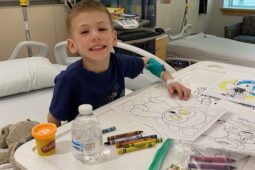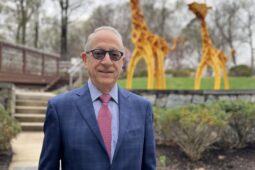Tyler Becomes Mr. Worldwide at The Children’s Inn
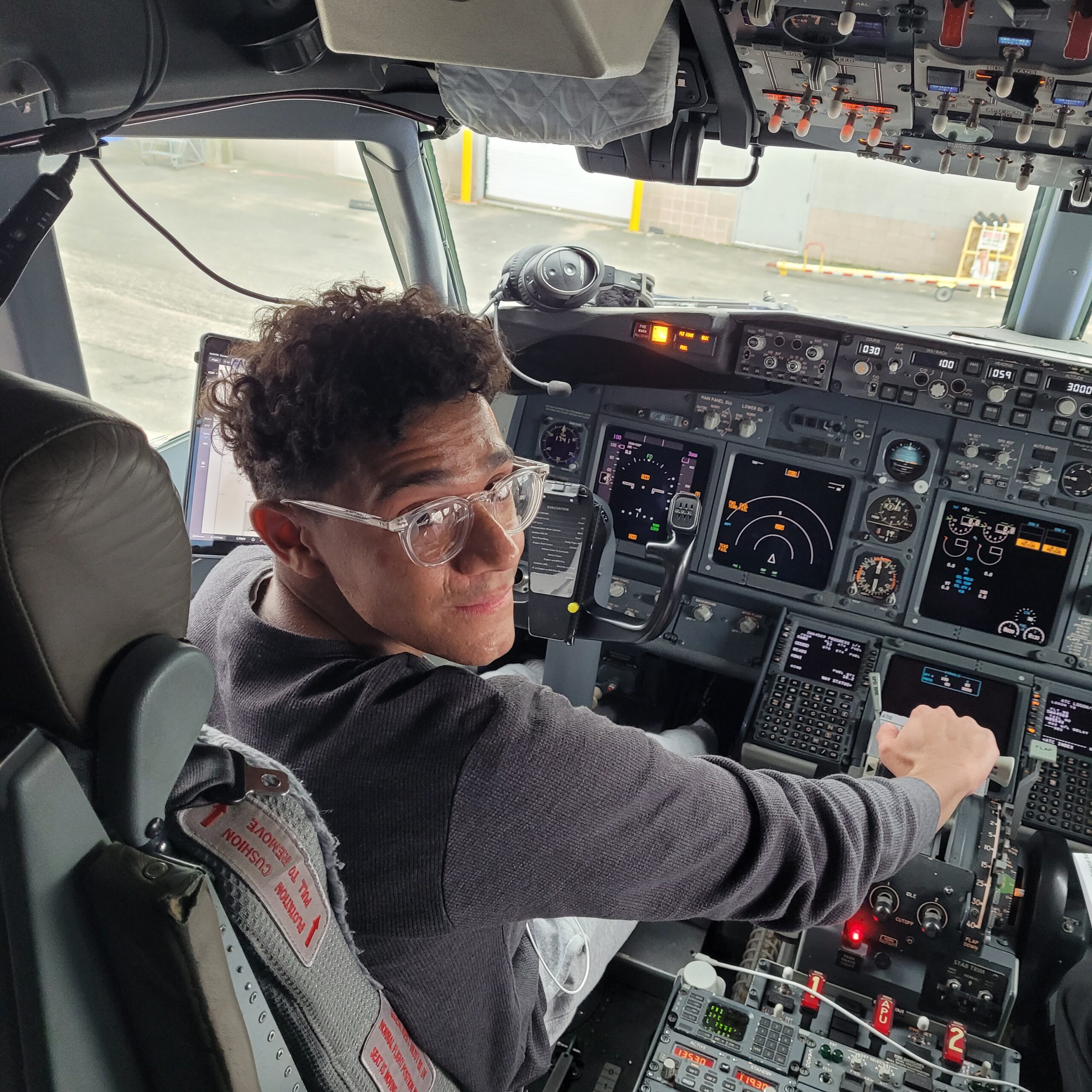
Tyler in the cockpit as part of his flight training
No illness slows down Tyler, a 16-year-old from Long Island, N.Y., who has been coming to The Children’s Inn at NIH for the better part of a decade. But even he would have to admit that it’s not for lack of trying. Tyler has a laundry list of official diagnoses so long that he has to pull out his phone, where he keeps a list of them all to remember everything.
“My doctors tell me that I’m the only person in the world with all these medical conditions combined,” Tyler says, almost proudly. “The hyper-IgE syndrome, only about 275 people in this country have it. So I’ll read off the list. There’s eosinophilic esophagitis, indeterminate colitis, boutonnière deformity, swan neck deformity, Raynaud’s phenomenon, vestibular migraines, asthma, eczema, hyper-IgE syndrome, lupus, osteoporosis, autoimmune hemolytic anemia, GERD, stomach ulcers, flat-footed, as well as environmental and food allergies.”
Hyper-IgE syndrome, more commonly known as Job’s syndrome, is at the heart of it all. By itself, a rare primary immunodeficiency, Job’s syndrome is a genetic mutation in DNA that left Tyler in a struggle right from the start.
“He had trouble breathing right after birth,” his mother, Danielle, remembered. “He had to stay at the NICU for a month, and the hospital didn’t know what to do for him, so they sent him to Stony Brook University Hospital. They transported him there in a special ambulance which was like a mini operating room. They wouldn’t let me go with him, which was a little scary.”
Tyler would remain there for another three weeks before being diagnosed with pneumonia and finally getting discharged from the NICU. But his problems were just beginning. He quickly developed what Danielle described as a “horrific rash” that lasted for months and stumped several doctors. “By the time he was two years old, he had three or four full cardiology workups. We finally found a pulmonologist who had been following him for years who thought he had this rare syndrome, Job’s syndrome.”
Tests done in April of 2013 were sent to the National Institutes of Health, where they confirmed the Job syndrome diagnosis. Tyler was just seven years old when he began making regular trips to the NIH as part of a clinical trial.
For most of those visits, Tyler has stayed at The Children’s Inn. It took some time, but it has grown into a place he looks forward to visiting.
“The first time I came here, I was very pessimistic about everything,” he admitted. “I wanted to go home. We were only staying for a couple of days and we were in the hospital almost all day, so I didn’t get much chance to explore. But now I appreciate this place more. I appreciate that sense of community. I’ve made a bunch of friends here. You walk out of your room, and they’re right there, so that’s nice.”
Whether at The Inn or home on Long Island, Tyler has kept himself remarkably busy. He dreams of becoming a pilot and has his flight plan all charted out. “I want to fly the 737 and then the 777 for Delta Airlines,” he explained. “Maybe Southwest first, or maybe straight to Delta.”
Tyler is off to a strong start on that goal. For years, he downloaded flight simulator games. Tyler started with lower-quality versions, then kept getting more and more advanced over the years. Eventually, he moved on to more professional computer simulators and is also a student member of the Experimental Aircraft Association. He also has achieved the rank of a non-commissioned officer and element leader in his squadron as a cadet in the Civil Air Patrol.
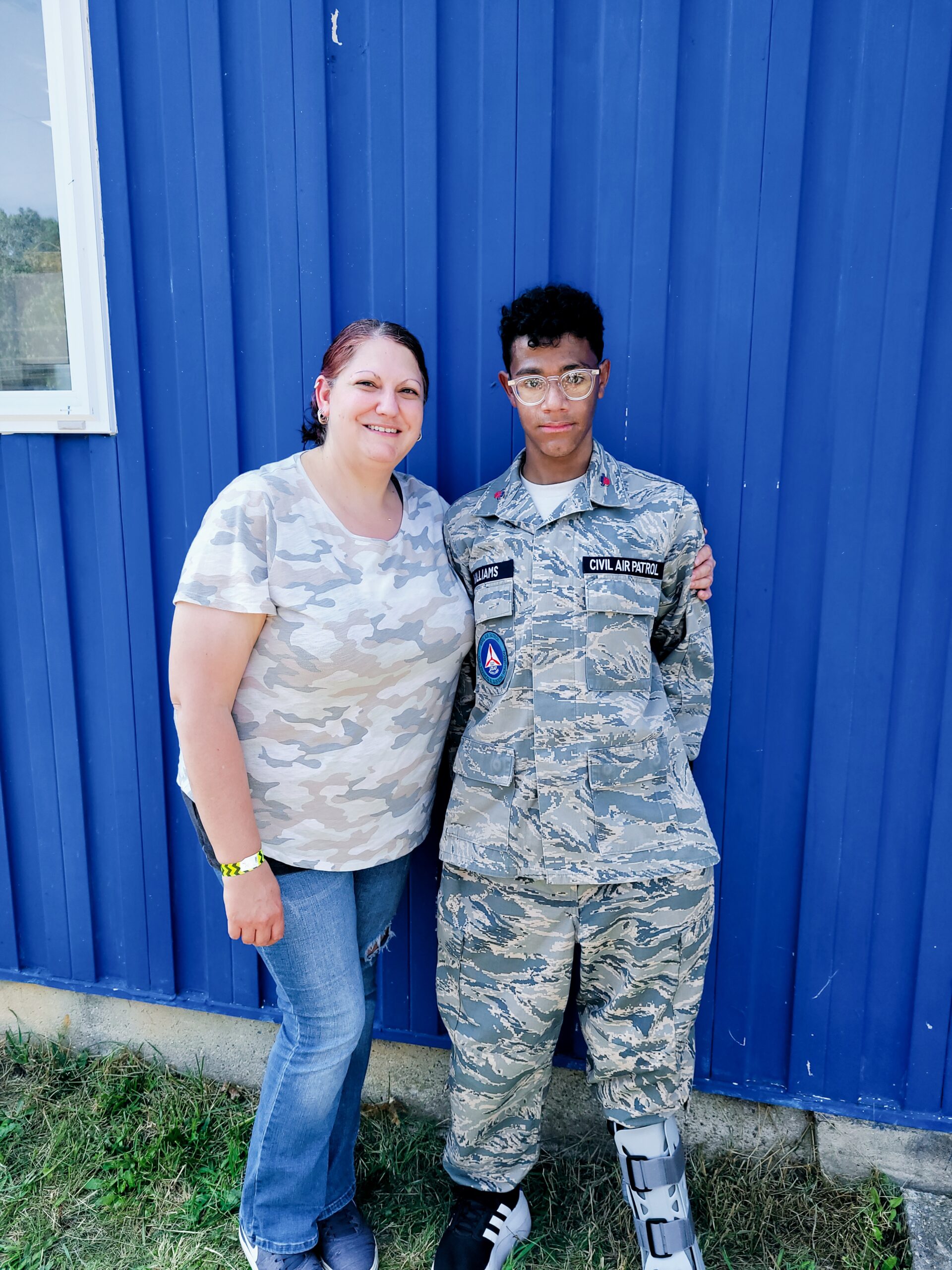
Tyler in his Civil Air Patrol uniform alongside his mother, Danielle
Though his focus is undeniable, Tyler does not have tunnel vision. He is a search and rescue officer and trains every other week in that role. A member of the National Honors Society and the National Society of High School Scholars, Tyler serves as his high school chapter’s historian despite being home-schooled (he hopes to return to school in person before the end of the year). And he runs a YouTube channel and started his own small business.
“My YouTube channel is a partnership, and we hope to be able to [monetize] it soon,” he said. “My other business is an online e-commerce business, and I am the sole proprietor.”
Growing up, Tyler spent countless hours building Lego sets, acquiring more and more over the years before he moved on from that phase of his life. A little more than a year ago, as his parents cleaned out some of his old things, Tyler discovered the high market value for sets such as his own and, with his father’s encouragement, set up “an online Lego version of Shopify” to sell his sets. It opened last year and has done about $1,500 in sales so far.
Through it all, Tyler has continued coming to the NIH as the number of ailments increases. Tyler has been a part of a clinical trial under the direction of Dr. Alexandra Freeman at the National Institute of Allergy and Infectious Diseases (NIAID) since he first came to the NIH in 2013. The treatment primarily consists of antibiotics. A bone marrow transplant, though, is less likely for Tyler than other Job’s syndrome sufferers because he is of mixed race. The search for a donor is still ongoing, but the odds remain long.
Danielle explained that several times they arrived at NIH for one reason, and doctors discovered unnerving results in his lab work that eventually led to new diagnoses. “The team of doctors here is amazing,” Danielle said. “Any time I have an issue, I can email, and they get back to me, day or night. I’m so thankful. If we hadn’t been coming here, we wouldn’t even know that he had those other things. The doctors at home were only looking for what they needed to look for; they didn’t look for those things that they didn’t have a reason to. Here [at NIH], they look for everything. The bigger picture.”
One of those new diagnoses, osteoporosis, was added to Tyler’s list in 2016. Since then, he has experienced 34 documented bone fractures. “It’s probably more like 54,” he laughed, noting that his high pain tolerance often allows him to ignore more minor breaks in fingers or toes. But the efforts of his doctors have allowed him to reach a point where the mundane fractures – sometimes occurring from such simple activities as knocking into a table with his hand – are far less frequent.
Another condition doctors discovered in Tyler while at the NIH was lupus, an autoimmune disease that occurs when the immune system attacks its own tissues. Diagnosed in Tyler in 2019, lupus is less likely to cause damage to organs when caught early, as his was. But it was still another distinction for Tyler, who can boast an immune system that is simultaneously deficient and overactive. “It’s like he doesn’t have an immune system, but his immune system is fighting itself,” Danielle laughed. “We don’t know how that can happen.”
An infection came the closest to slowing him down. In 2020, early in the COVID-19 pandemic, what started as a small boil on his leg left Tyler in excruciating pain all over his body. Dr. Freeman worked with Tyler’s parents to ensure he was getting the medical care he needed while avoiding COVID hotspots – such as New York-area hospitals. Still, he was largely immobile for months, but even sitting was painful as he had to contort his body into different positions to relieve the pain temporarily. Only now is he beginning to build his muscles back up from the prolonged stretches of immobility, using a walker to go about his daily life.
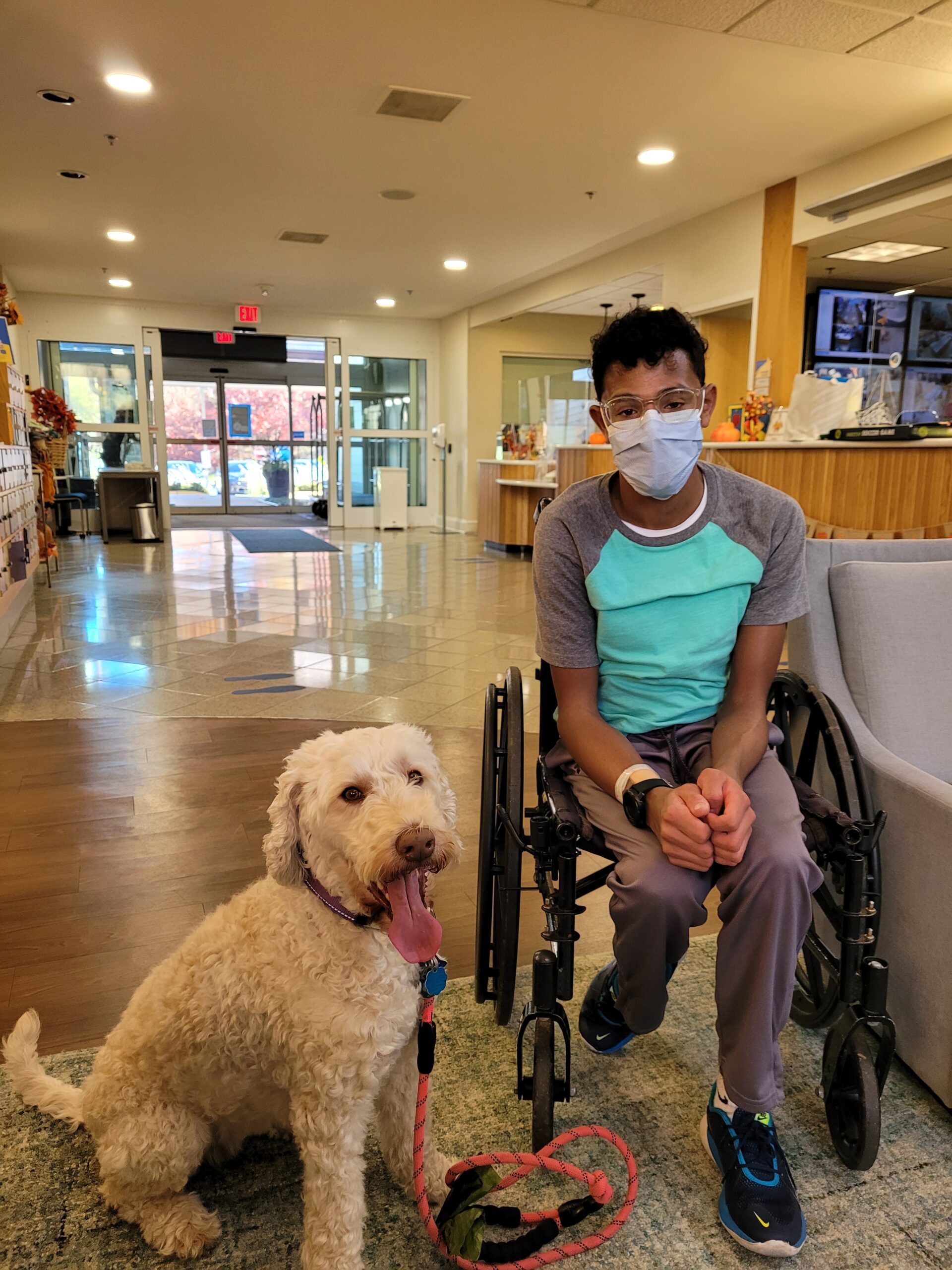
Tyler and Zilly at The Children’s Inn at NIH
But after those early uncertain visits, and despite often leaving with a longer list of maladies than they arrived with, Tyler and Danielle are grateful for their experiences at The Children’s Inn.
“They make it worry-free,” Danielle smiled. “You’re here with your child who is sick, and that’s your top priority. They provide so much, and there is a sense of hominess, a sense that we’re all in the same boat. It just makes you feel a sense of security.”
For Tyler’s part, The Inn has broadened his already sky-high ambition even further. “I’m Mr. Worldwide now,” Tyler joked. “I’ve made friends from all over the world. Borders almost come down here in a way. We’re all here for the same reason. The people are always very nice, staff and patients alike. I couldn’t imagine being here and staying anywhere else.”

